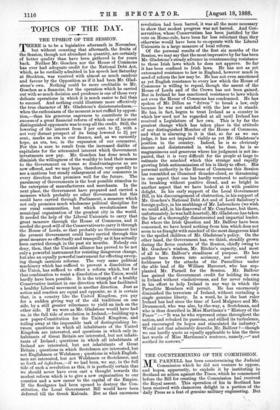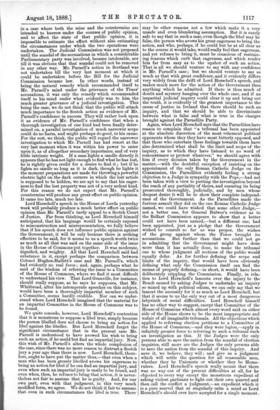COlJNTERMINLNG OF THE COMMISSION.
MR. PARNELL has been countermining the Judicial Commission which he did not venture to oppose, and hopes, apparently, to explode it by instituting in Scotland an action against the Times, which he commenced before the Bill for creating the Commission had received the Royal assent. This operation of his in Scotland has been received with clamorous delight in a portion of the daily Press as a feat of genuine military engineering. But in a case where both the mine and the countermine are intended to burrow under the courses of public opinion, and to affect the state of that public opinion, it is impossible to estimate the effect without also estimating the circumstances under which the two operations were undertaken. The Judicial Commission was not proposed until the scandal of the accusations in which a considerable Parliamentary party was involved, became intolerable, nor till it was obvious that that scandal could not be removed in any other way. Mr. Parnell's action in Scotland was not undertaken till the very last moment at which it could be undertaken before the Bill for the Judicial Commission became law. In other words, instead of being the natural remedy which recommended itself to Mr. Parnell's mind under the grievance of the Times' accusations, it was only the remedy which recommended itself to his mind, under what evidently was to him the much greater grievance of a judicial investigation. This being the case, we do not think that the public will attach much importance to the Scotch action as evidence of Mr. Parnell's confidence in success. They will rather look upon it as evidence of Mr. Parnell's confidence that when a thorough investigation of one kind, had been finally deter- mined on, a parallel investigation of much narrower scope could do no harm, and might perhaps do good, to his cause.
For the rest, we think, the public will regard the narrower investigation to which Mr. Parnell has had resort at the very last moment when it was within his power to enter upon it, as of altogether secondary importance, and of very little intrinsic weight If a man aghts a candle directly it appears that he has not light enough to find what he has lost, he is rightly given credit for a desire to find it ; but if he lights no candle so long as it is dark, though he lights it the moment preparations are made for throwing a powerful electric light on the dark corners in which the lost article is supposed to be hidden, we are apt to say that his eager- ness to find the lost property was not of a very ardent kind. For this reason we do not expect that Mr. Parnell's countermine will produce any great effect on public opinion. It came too late, much too late.
Lord Herschell's speech in the House of Lords yesterday week will probably produce a much better effect on public opinion than Mr. Parnell's tardy appeal to a Scotch Court of Justice. Far from thinking, as Lord Herschell himself anticipated, that his language would be certainly exposed to misconstruction and misrepresentation, we fully believe that if his speech does not influence public opinion against the Government, it will be only because there is nothing effective to be said, for it seems to us a speech worth twice as much as all that was said on the same side of the issue in the House of Commons put together. It was moderate, dignified, and weighty. All that Lord Herschel said had substance in it, except perhaps the comparison between Colonel Hughes-Hallett's case and Mr. Parnell's, which had evidently no real force ; and, again, perhaps what he said of the wisdom of referring the issue to a Committee of the House of Commons, where we find it most difficult to understand his view. That Lord Granville, for instance, should really suppose, as he says he supposes, that Mr. Whitbread, after his intemperate speeches on this subject, would have been a thoroughly impartial member of such a Committee, seems hardly credible. Nor can we under- stand where Lord Herschel imagined that the material for an impartial Committee in the House of Commons was to be found.
We quite concede, however, Lord Herschell's contention that it is monstrous to suppose a libel true, simply because the person libelled does not choose to bring an action for libel against the libeller. But Lord Herschel forgot the significant circumstance that in the present case Mr. Parnell is understood to have avowed his wish to bring such an action, if he could but find an impartial jury. Now this wish of Mr. Parnell's alters the whole complexion of the case, since there was no more reason to distrust a Scotch jury a year ago than there is now. Lord Herschel, there- fore, ought to have put the matter thus,—that even When a man who has been grossly libelled avows his eagerness to bring an action for libel if he can find an impartial jury, and even when such an impartial jury is easily to be found, and even when, then, he refuses to bring that action, it is never- theless not fair to assume that he is guilty. And, for our own part, even with that judgment, in this very much modified form, we agree. We do not think it fair to assume that even in such circumstances the libel is true. There may be other reasons not a few which make it a very unsafe and even blundering assumption. But it is surely safe to say that in such a case, even though the libel may be false, the person who avows his great eagerness to bring the action, and who, perhaps, if he could but be at all dear as to the course it would take, would really feel that eagerness, and yet refuses to bring it, must be conscious of restrain- ing reasons which curb that eagerness, and which render him far from easy as to the upshot of such an action. That is all we should venture to say with any confidence in Mr. Parnell's case ; but we should venture to say as much as that with great confidencb, and it evidently differs very widely from the drift of Lord Herschell's speech, and makes much more for the action of the Government than anything which he admitted. If there is thus much of doubt and mystery hanging over the whole case, and if an impartial judicial inquiry could clear it up and bring out the truth, it is evidently of the greatest importance to the cause of justice in Ireland that there should be such an inquiry, and that we should be able to discriminate between what is false and what is true in the charges brought against the Parnellite Party.
Again, when Lord Herschel says that the Parnellites have reason to complain that "a tribunal has been appointed at the absolute discretion of the most vehement political opponents whom they they have most bitterly opposed, and that those who entertain these feelings towards them have also determined what shall be the limit and scope of the inquiry, as to which they have listened to no word of remonstrance or protest whatever," we should agree with him if every decision taken by the Government in the matter,—with the doubtful exception of insisting on the' appointment of the only Roman Catholic Judge on the Commission, the Parnellites evidently feeling a strong objection to a Judge in sympathy with the Pope,—had not been taken with a view to putting the investigation beyond the reach of any partiality of theirs, and ensuring its being prosecuted thoroughly, judicially, and by men whose deepest desire it will be to show their complete independ- ence of the Government. As the Parnellites made the assault they did on the one Roman Catholic Judge named, we could have wished that some other Judge,— not a better one, for General Bulwer's evidence as to the Belfast Commission appears to show that a better could not have been named,—but a different one, had been appointed, just as a pledge that the Government wished to consult so far as was proper, the wishes of the group against whom the Times brought its accusations. But further than that we could not go in admitting that the Government might have done more than it has actually done, to make the tribunal one to whose judgment all sections of the public would equally defer. As for further defining the scope and limits of the inquiry, that would have been obviously defining what only the Commission itself can find the means of properly defining,—in short, it would have been deliberately crippling the Commission. Finally, in rela- tion to Lord Herschell's laments over the injury to the Bench caused by asking Judges to undertake an inquiry so mixed up with political odium, we can only say that we lament the necessity for it as much as Lord Herschel, but that it seems to us the only way out of a most dangerous labyrinth of social difficulties. Lord Herschell himself has no other way to suggest, except that Committee of the House of Commons which almost every word said on either side of the House shows to be the most inappropriate and unfair of all imaginable tribunals. All the objections which applied to referring election petitions to a Committee of the House of Commons,—and they were legion,—apply in infinitely greater force to referring to such a tribunal such an investigation as this. If the Judges were the only persons able to save the nation from the scandal of election inquiries, still more are the Judges the only persons able to save the nation from the scandal of this inquiry. And save it, we believe, they will ; and give us a judgment which will settle the question for all reasonable men, whether they be Unionists or whether they be Home- rulers. Lord Herschell's speech really means that there was no way out of the present difficulties at all, for he objected to every way except the monstrous expedient of asking violent partisans to fight out their own quarrel and then call the conflict a judgment, —an expedient which it is a pure marvel that so singularly calm a mind. as Lord. Herschell's should ever have accepted for a single moment.



































 Previous page
Previous page